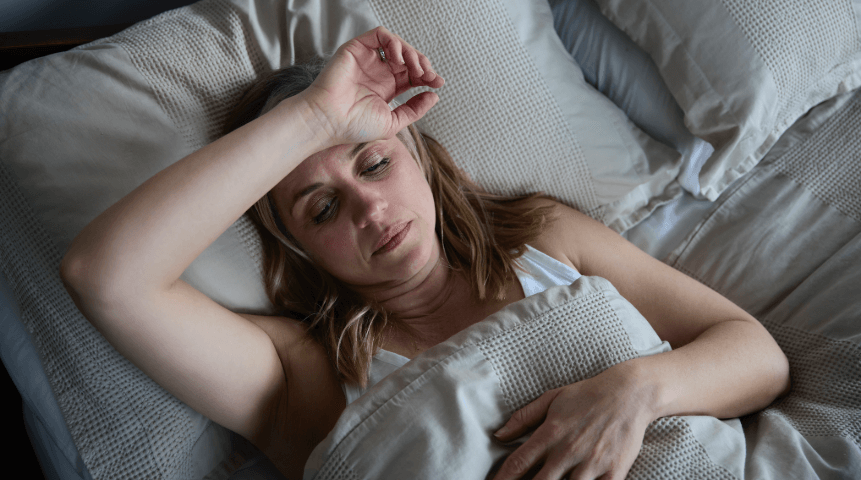If you find yourself tossing and turning throughout the night, only to wake up drenched in sweat, you’re not alone. According to the National Sleep Foundation, 61 percent of perimenopausal and postmenopausal women report frequent bouts of insomnia, often caused by hot flashes. Add next-day fatigue, irritability, anxiousness and concentration difficulties, and your chance for a good night’s sleep grows even dimmer.
Now, instead of counting sheep, start counting the ways you can put restful sleep back into your nightly routine. Even in menopause, you can get the beauty sleep you deserve.
7 Ways to Beat the Menopause Can’t-Sleep Blues
Menopause can affect behavior in many ways, but difficulty sleeping doesn’t have to be one of them. Here’s a list of activities, both medicinal and natural, that can help you look forward to a better night’s sleep.
1. Consider Hormone Replacement Therapy
Hormone replacement therapy (HRT) remains the gold standard for treating hot flashes and other menopause symptoms. Keep in mind, however, that women who are at high risk for breast cancer or have a history of blood clots and certain other medical conditions should not take HRT. Alternatives such as low-dose antidepressants like fluoxetine (Prozac) may be effective, and for perimenopausal women, low-dose combination birth control pills may control hot flashes and even out irregular periods.
2. Get Moving
According to a study from Northwestern University, regular aerobic exercise can improve the quality of your sleep, mood and vitality. Whether it’s a walk around the block, or a lively aerobics class, aerobic exercise yields positive results. One note: be aware of the timing of exercising. You don’t want to exercise two to three hours before bedtime, as it can interfere with rest.
3. Mindfully Sip
Caffeine — a stimulant found in coffee, colas, tea and chocolate — can take up to eight hours to leave your system. Not only can it keep you awake, it can also trigger hot flashes in some women. It’s best to avoid it, but if you must, have it early in the day.
Alcohol is also a no-no before bed. It’s another possible hot flash trigger, and although it may initially relax you and help you fall asleep, it can make it difficult for you to stay asleep. It also keeps you from the deep, restorative stages of sleep you need to wake up rested and ready to start a new day.
4. Stay Cool
To ward off hot flashes and night sweats, keep the temperature in your bedroom comfortable and low. Wear breathable cotton sleepwear and choose cotton sheets over synthetic materials. Before bed, consider taking a cool shower. If you wake up because of hot flashes (or for another reason), don’t just lie awake in bed. After 20 minutes, get up and do something relaxing until you start to feel sleepy. It’s much more effective than worrying about not sleeping.
5. Relax. Breathe. Repeat.
If anxiety during menopause is keeping you awake at night, relaxation techniques such as meditation, yoga or deep breathing can help you de-stress. Soothing music or pleasurable reading may also lull you to sleep. If hot flashes aren’t a problem, a soothing, warm bath can also set the stage for a good night’s sleep.
6. Stay on Schedule
When you go to bed and wake up at about the same time every day, you increase your chances for a restful sleep. If you like the idea of an afternoon nap, indulge before 3 p.m. so that it won’t interfere with nighttime slumber. Also, exposure to daylight transfers to better sleep patterns, so get outside at least 30 minutes a day to soak up the sun. Just don’t forget the sunscreen.
7. See a Sleep Specialist
If menopause symptoms are negatively impacting your sleep patterns, it may be time to see a sleep specialist. Not only is chronic insomnia exhausting and frustrating, it can contribute to heart disease, high blood pressure and other lasting medical conditions. It can also affect your job performance and overall quality of life. So become empowered. Seek help. Sleep soundly.
Now that you can see a path to better sleep, you can look forward to crawling into bed and sleeping peacefully throughout the night. Sweet dreams. You deserve them.
Download a Guide to Understanding Menopause
Learn more about understanding menopause, services available, screenings you need, and important medical history to provide to your physician on your next appointment.
Get Your Guide










